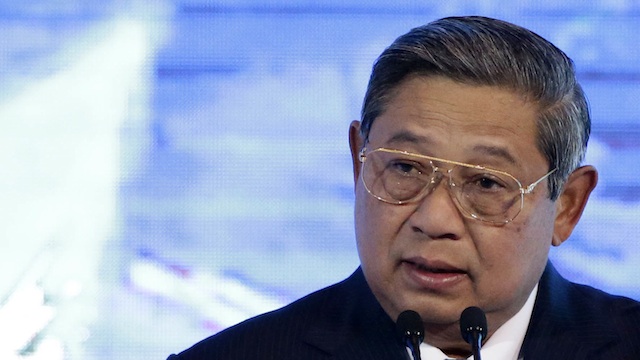SUMMARY
This is AI generated summarization, which may have errors. For context, always refer to the full article.

SYDNEY, Australia – Australian spy agencies attempted to listen to the phone calls of Indonesian President Susilo Bambang Yudhoyono and targeted his wife and senior ministers, reports said Monday, November 18, drawing a demand for answers from Jakarta.
Secret documents leaked by US intelligence fugitive Edward Snowden, obtained by the Australian Broadcasting Corporation and The Guardian newspaper, name the president and nine of his inner circle as targets of the surveillance.
The embarrassing details emerged with ties between the strategic allies already strained over previous spying allegations and how to deal with boatpeople heading for Australia via Indonesia.
The documents show that Australia’s electronic intelligence agency tracked Yudhoyono’s activity on his mobile phone for 15 days in August 2009, when Labor’s Kevin Rudd was prime minister.
Weeks before, twin blasts at luxury hotels in the Indonesian capital – the JW Marriott and Ritz-Carlton – had killed seven people, including three Australians.
The directorate reportedly intercepted at least one call.
A list of targets also included Yudhoyono’s wife Ani, Vice President Boediono – who was in Australia last week, former vice president Jusuf Kalla, the foreign affairs spokesman, the security minister and the information minister, the reports said.
Yudhoyono’s office demanded an explanation from Canberra.
“The Australian government urgently needs to clarify on this news to avoid further damage,” spokesman Teuku Faizasyah told Agence France-Presse in a text message.
“The damage has been done,” he added.
Another name on the list, former minister for state-owned enterprises and communication, Sofyan Djalil, told Agence France-Presse: “We are not happy.”
But he added: “Diplomatic relations always have their ups and downs. This has caused anger in the short-term, but in the long-term, we are still neighbors and I think we will overcome this.”
Australian Prime Minister Tony Abbott refused to comment on the latest claims when pressed in parliament, but said Indonesia was an important partner.
“I will never say or do anything that might damage the strong relationship and the close cooperation that we have with Indonesia, which is all in all, our most important relationship,” he said, adding that he wanted it to “grow stronger in the months and years ahead”.
The ABC said one of the documents was titled “3G impact and update” and appeared to chart attempts by Australian intelligence to keep pace with the rollout of 3G technology in Indonesia and across Southeast Asia.
A number of intercept options were listed and a recommendation was made to choose one of them and to apply it to a target – in this case the Indonesian leadership, the broadcaster said.
The latest release of Snowden documents comes just weeks after reports claimed Canberra’s overseas diplomatic posts, including in Jakarta, were involved in a vast US-led surveillance network, which sparked an angry reaction from Indonesian Foreign Minister Marty Natalegawa.
This was followed by claims that Australia and the United States mounted a joint surveillance operation on Indonesia during 2007 UN climate talks in Bali.
In an interview with the ABC on Sunday, before the latest revelations, Vice President Boediono played down suggestions of a rift with Australia, shrugging off the disputes as normal neighborly problems.
“It’s normal for next-door neighbors to have problems,” he said, but admitted to public concern in Indonesia over the espionage allegations.
Alexander Downer, the foreign minister under John Howard’s conservative government, said the revelations were damaging to Australia.
“It’s a shocking situation in which Australia will pay a big price,” he told Sky News, while Greens leader Christine Milne said it showed the “extent to which this country has slipped down the US path of universal surveillance”.
Former US National Security Agency (NSA) contractor Snowden was given asylum in Russia in August, to the fury of the United States where he is wanted on espionage charges following disclosures that have provoked international uproar and strained ties with allies.
He is behind revelations of American spying in Germany, including the tapping of Chancellor Angela Merkel’s phone. – Rappler.com
Add a comment
How does this make you feel?





There are no comments yet. Add your comment to start the conversation.